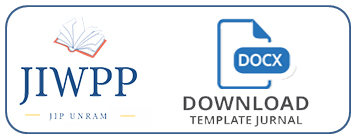WORKSHOP PENYUSUNAN BOOKLET PEMBELAJARAN NUMERASI SESUAI LEVEL KEMAMPUAN SISWA BAGI PENGAWAS SD/MI
DOI:
https://doi.org/10.29303/interaktif.v4i1.140Keywords:
numeracy learning, supervisor’s roles, booklet of independent learning activities, Kurikulum MerdekaAbstract
Implementation of Kurikulum Merdeka has been focused on creating students’ characteristics-based learning, particularly in numeracy learning. Accomplishment of such mission requires supervisor involvement. So far, Kurikulum Merdeka piloting only focused on teacher competency improvement with little attention to supervisor involvement. Present workshop is aimed at increasing supervisor readiness for supporting numeracy learning which is based on students’ prior ability. Present workshop was attended by 17 representatives of SD/MI supervisor in District of Lombok Tengah. The workshop was conducted by means of oral presentations, class discussions, small group discussion, and group presentation. The workshop resulted 4 drafts of prior ability-based booklets. The booklets are expected to improve students’ early numeracy skills. However, the booklets are not variative enough to accommodate various essential learning materials in numeracy learning. Therefore, continuous collaboration is necessary for ensuring effective numeracy learning in the era of Kurikulum Merdeka.
References
Anggraeni, A., Herutami, I., Anggraena, Y., & Saad, Y. (2021). Panduan Penyusunan KOSP di Satuan Pendidikan. Kementerian Pendidikan, Kebudaya, Riset dan Teknologi.
Aunio, P., Heiskari, P., Van Luit, J. E., & Vuorio, J. M. (2015). The development of early numeracy skills in kindergarten in low-, average- and high-performance groups. Journal of Early Childhood Research, 13(1), 3–16. https://doi.org/10.1177/1476718X14538722.
Aunio, P., Korhonen, J., Ragpot, L., Törmänen, M., & Henning, E. (2021). An early numeracy intervention for first-graders at risk for mathematical learning difficulties. Early Childhood Research Quarterly, 55, 252–262. https://doi.org/10.1016/j.ecresq.2020.12.002.
Bondie, R. S., Dahnke, C., & Zusho, A. (2019). How Does Changing “One-Size-Fits-All” to Differentiated Instruction Affect Teaching? Review of Research in Education, 43(1), 336–362. https://doi.org/10.3102/0091732X18821130.
Chang, I. (2023). Early numeracy and literacy skills and their influences on fourth-grade mathematics achievement: a moderated mediation model. Large-Scale Assessments in Education, 11(1). https://doi.org/10.1186/s40536-023-00168-6.
Colliver, Y. (2018). Fostering young children’s interest in numeracy through demonstration of its value: the Footsteps Study. Mathematics Education Research Journal, 30(4), 407–428. https://doi.org/10.1007/s13394-017-0216-4.
Geiger, V. (2016). Teachers as Designers of Effective Numeracy Tasks. In White, B., Chinnappan, M. & Trenholm, S. (Eds.). Opening up Mathematics Education Research (Proceedings of the 39th Annual Conference of the Mathematics Education Research Group of Australasia), 2013, 254–261. http://libezproxy.open.ac.uk/login?url=https://search.ebscohost.com/login.aspx?direct=true&db=eric&AN=ED572390&site=ehost-live&scope=site.
Gunayasa, I. B. K., Zain, M. I., Wardani, K. S. K., & Astria, F. P. (2021). PENYULUHAN TENTANG PENGEMBANGAN LITERASI BACA DAN NUMERASI MELALUI MEDIA POP UP BOX DI SEKOLAH DASAR SE-KECAMATAN PRAYA LOMBOK TENGAH. Jurnal Interaktif: Warta Pengabdian Pendidikan, 1(2), 1 - 10. https://doi.org/10.29303/interaktif.v1i2.11
Hakim, F., Fitriani, Elisabeth Intan Lumme, Rasnida, Nur Aisyah S, & Pipin Lestari. (2023). MENINGKATKAN KEMAMPUAN LITERASI, NUMERASI, DAN ADAPTASI TEKNOLOGI DI SMPN 8 SATAP MAJENE MELALUI PROGRAM KAMPUS MENGAJAR . Jurnal Interaktif: Warta Pengabdian Pendidikan, 3(1), 47 - 54. https://doi.org/10.29303/interaktif.v3i1.85
Gunayasa, I. B. K., Zain, M. I., Wardani, K. S. K., & Astria, F. P. (2021). PENYULUHAN TENTANG PENGEMBANGAN LITERASI BACA DAN NUMERASI MELALUI MEDIA POP UP BOX DI SEKOLAH DASAR SE-KECAMATAN PRAYA LOMBOK TENGAH. Jurnal Interaktif: Warta Pengabdian Pendidikan, 1(2), 1 - 10. https://doi.org/10.29303/interaktif.v1i2.11
Hakim, F., Fitriani, Elisabeth Intan Lumme, Rasnida, Nur Aisyah S, & Pipin Lestari. (2023). MENINGKATKAN KEMAMPUAN LITERASI, NUMERASI, DAN ADAPTASI TEKNOLOGI DI SMPN 8 SATAP MAJENE MELALUI PROGRAM KAMPUS MENGAJAR . Jurnal Interaktif: Warta Pengabdian Pendidikan, 3(1), 47 - 54. https://doi.org/10.29303/interaktif.v3i1.85
Gunayasa, I. B. K., Zain, M. I., Wardani, K. S. K., & Astria, F. P. (2021). PENYULUHAN TENTANG PENGEMBANGAN LITERASI BACA DAN NUMERASI MELALUI MEDIA POP UP BOX DI SEKOLAH DASAR SE-KECAMATAN PRAYA LOMBOK TENGAH. Jurnal Interaktif: Warta Pengabdian Pendidikan, 1(2), 1 - 10. https://doi.org/10.29303/interaktif.v1i2.11
Grotlüschen, A., Mallows, D., Reder, S., & Sabatini, J. (2016). Adults with Low Proficiency in Literacy or Numeracy Adults with Low Proficiency in Literacy or Numeracy Anke Grotlüschefile:///C:/Users/swettke/Downloads/WLF-FINAL-ECONOMIC-REPORT.pdfn , David Mallows ,. January.
Hakim, F., Fitriani, Elisabeth Intan Lumme, Rasnida, Nur Aisyah S, & Pipin Lestari. (2023). MENINGKATKAN KEMAMPUAN LITERASI, NUMERASI, DAN ADAPTASI TEKNOLOGI DI SMPN 8 SATAP MAJENE MELALUI PROGRAM KAMPUS MENGAJAR . Jurnal Interaktif: Warta Pengabdian Pendidikan, 3(1), 47 - 54. https://doi.org/10.29303/interaktif.v3i1.85
Hassinger-Das, B., Jordan, N. C., & Dyson, N. (2015). Reading Stories to Learn Math: Mathematics Vocabulary Instruction for Children with Early Numeracy Difficulties. Elementaray School Journal, 116(2), 242–246. https://doi.org/10.1086/683986.
Jain, P., & Rogers, M. (2019). Numeracy as critical thinking. Adults Learning Mathematics International Journal, 14(1), 23–33.
Kemendikbudristek. (2021). Pembelajaran Paradigma Baru. In Badan Penelitian dan Pengembangan dan Perbukuan 2021. Kementerian Pendidikan, Kebudaya, Riset dan Teknologi. https://books.google.com/books?hl=en&lr=&id=3AZGEAAAQBAJ&oi=fnd&pg=PA2&dq=sakralitas+maluku&ots=BPWBm1oFwQ&sig=5uh07--OD0F07zlJdl654EJRNvc.
Miller, T. (2018). Developing numeracy skills using interactive technology in a play-based learning environment. International Journal of STEM Education, 5(1). https://doi.org/10.1186/s40594-018-0135-2.
Parsons, S., & Bynner, J. (2006). Does numeracy matter more? national research and development centre for adult literacy and numeracy. Institute of Education. www.ioe.ac.uk/bedfordgroup.
Purpura, D. J., & Lonigan, C. J. (2015). Early Numeracy Assessment: The Development of the Preschool Numeracy Scales. Early Education Development, 26(2), 286–313. https://doi.org/10.1080/10409289.2015.991084.
Raghubar, K. P., & Barnes, M. A. (2017). Early numeracy skills in preschool-aged childern: A review of neurocognitive findings and iplicatitons for assesment and intervention. Clinical Neuropsychology, 31(2), 329–351. https://doi.org/10.1080/13854046.2016.1259387.
Schleicher, A. (2023). Programme for International Student Assessment (PISA) 2022 : Insights and Interpretations. In OECD. OECD Publishing.
Tomlinson, C. A. (2001). How to Differentiate Instruction in Mixed-Ability Classroom (Second Edi). ASCD.
van Geel, M., Keuning, T., Frèrejean, J., Dolmans, D., van Merriënboer, J., & Visscher, A. J. (2019). Capturing the complexity of differentiated instruction. School Effectiveness and School Improvement, 30(1), 51–67. https://doi.org/10.1080/09243453.2018.1539013.
Wannenburg, E., & Curlewis, L. (2023). Exploring the need for numeracy skills in legal practice. Cogent Education, 10(1). https://doi.org/10.1080/2331186X.2023.2190307.















